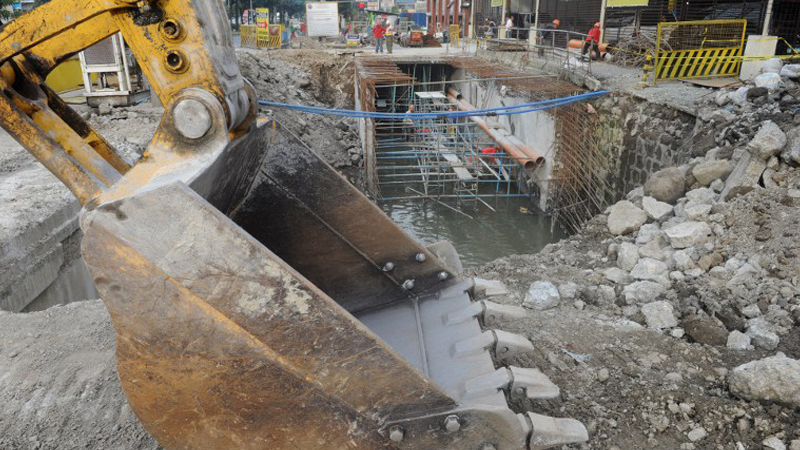World Bank OKs co-financing with AIIB for Metro Manila flood control

In this file photo taken Oct. 9, 2014, workers are working on one of about a hundred projects to control flooding in Metro Manila. AFP FILE PHOTO
The World Bank has green-lighted its counterpart financing for the $500-million Metro Manila Flood Management Project a day after the China-led Asian Infrastructure Investment Bank (AIIB) approved its share.
In a statement Friday, the Washington-based multilateral lender said its board of executive directors approved the $207.6-million loan on Sept. 28.
To recall, the AIIB board on Sept. 27 gave its go-ahead for its $207.6-million share, its first loan to the Philippines.
The remaining $84.7 million will come from the national government.
“Under the Metro Manila Flood Management Project, 36 existing pumping stations will be modernized, 20 new ones will be constructed, and supporting infrastructure along critical waterways will be improved in the cities of Manila, Pasay, Taguig, Makati, Malabon, Mandaluyong, San Juan, Pasig, Valenzuela, Quezon City and Caloocan. Many of Metro Manila’s existing pumping stations were built in the 1970s and have become inefficient and underperforming,” the World Bank said.
The project aimed for completion in 2024 will be jointly implemented by the Department of Public Works and Highways and the Metro Manila Development Authority, with support from the National Housing Authority, the Social Housing Finance Corp. as well as local government units.
“Recurrent flooding has made life more difficult for the poorest populations who live in low-lying areas, on riverbanks, and in other danger zones. When floods occur, the capacity of people to earn a living is constrained, and many can fall back into poverty. Investments that improve flood management helps protect vulnerable communities as well as boost resilience against the impact of climate change,” said Mara Warwick, World Bank country director for Brunei, Malaysia, the Philippines and Thailand.
“The lives of people in metropolitan Manila—especially the poor, women and children—are severely affected by exposure to frequent cyclones and flooding induced by heavy rain. The floods disrupt business and commercial activities, causing unnecessary economic costs. Investing in sustainable infrastructure is a key priority for AIIB and we feel this project is a great fit for our first investment in the Philippines,” the World Bank quoted AIIB director general for investment operations Supee Teravaninthorn as saying.
For his part, Public Works Secretary Mark A. Villar was quoted as saying that “with this project, the government is taking an important step in the implementation of the Metro Manila Flood Management Master Plan designed to safely control floods in the national capital region and surrounding areas,” referring to the blueprint approved by the government in 2012, which was crafted through financial as well as technical support from the World Bank.
“The master plan will take 25 years to implement, but this phase of modernizing Metro Manila’s pumping stations will ensure that several million residents will be less vulnerable to floods,” Villar said. /jpv
